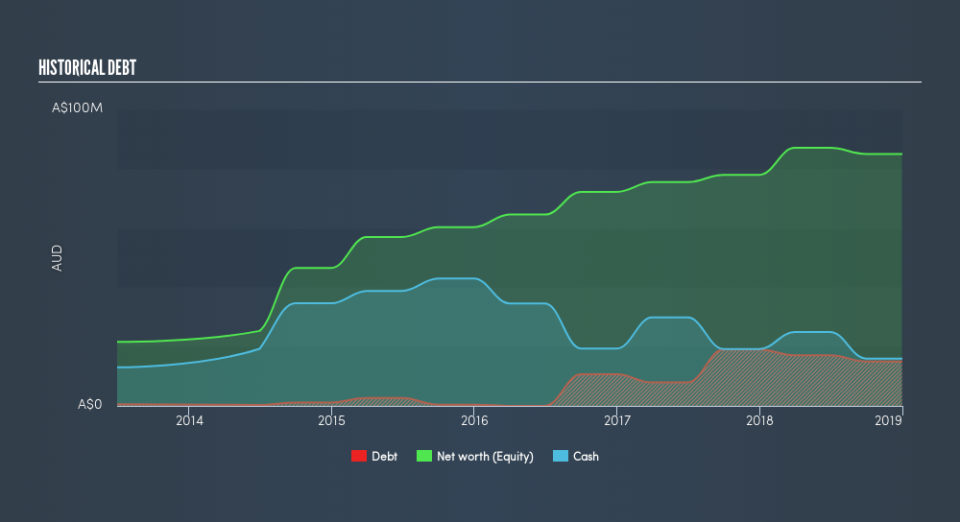Citadel Group (ASX:CGL) Seems To Use Debt Quite Sensibly

The external fund manager backed by Berkshire Hathaway's Charlie Munger, Li Lu, makes no bones about it when he says 'The biggest investment risk is not the volatility of prices, but whether you will suffer a permanent loss of capital.' So it might be obvious that you need to consider debt, when you think about how risky any given stock is, because too much debt can sink a company. We note that The Citadel Group Limited (ASX:CGL) does have debt on its balance sheet. But the real question is whether this debt is making the company risky.
What Risk Does Debt Bring?
Debt assists a business until the business has trouble paying it off, either with new capital or with free cash flow. In the worst case scenario, a company can go bankrupt if it cannot pay its creditors. However, a more common (but still painful) scenario is that it has to raise new equity capital at a low price, thus permanently diluting shareholders. By replacing dilution, though, debt can be an extremely good tool for businesses that need capital to invest in growth at high rates of return. The first step when considering a company's debt levels is to consider its cash and debt together.
View our latest analysis for Citadel Group
What Is Citadel Group's Debt?
You can click the graphic below for the historical numbers, but it shows that Citadel Group had AU$15.0m of debt in December 2018, down from AU$19.8m, one year before. However, its balance sheet shows it holds AU$16.0m in cash, so it actually has AU$989.0k net cash.
A Look At Citadel Group's Liabilities
Zooming in on the latest balance sheet data, we can see that Citadel Group had liabilities of AU$36.2m due within 12 months and liabilities of AU$20.8m due beyond that. Offsetting these obligations, it had cash of AU$16.0m as well as receivables valued at AU$33.6m due within 12 months. So its liabilities total AU$7.43m more than the combination of its cash and short-term receivables.
Given Citadel Group has a market capitalization of AU$224.6m, it's hard to believe these liabilities pose much threat. However, we do think it is worth keeping an eye on its balance sheet strength, as it may change over time. Despite its noteworthy liabilities, Citadel Group boasts net cash, so it's fair to say it does not have a heavy debt load!
Also good is that Citadel Group grew its EBIT at 11% over the last year, further increasing its ability to manage debt. When analysing debt levels, the balance sheet is the obvious place to start. But ultimately the future profitability of the business will decide if Citadel Group can strengthen its balance sheet over time. So if you're focused on the future you can check out this free report showing analyst profit forecasts.
Finally, a business needs free cash flow to pay off debt; accounting profits just don't cut it. While Citadel Group has net cash on its balance sheet, it's still worth taking a look at its ability to convert earnings before interest and tax (EBIT) to free cash flow, to help us understand how quickly it is building (or eroding) that cash balance. Over the most recent three years, Citadel Group recorded free cash flow worth 51% of its EBIT, which is around normal, given free cash flow excludes interest and tax. This cold hard cash means it can reduce its debt when it wants to.
Summing up
While it is always sensible to look at a company's total liabilities, it is very reassuring that Citadel Group has AU$989k in net cash. And it also grew its EBIT by 11% over the last year. So we don't have any problem with Citadel Group's use of debt. We'd be motivated to research the stock further if we found out that Citadel Group insiders have bought shares recently. If you would too, then you're in luck, since today we're sharing our list of reported insider transactions for free.
If, after all that, you're more interested in a fast growing company with a rock-solid balance sheet, then check out our list of net cash growth stocks without delay.
We aim to bring you long-term focused research analysis driven by fundamental data. Note that our analysis may not factor in the latest price-sensitive company announcements or qualitative material.
If you spot an error that warrants correction, please contact the editor at editorial-team@simplywallst.com. This article by Simply Wall St is general in nature. It does not constitute a recommendation to buy or sell any stock, and does not take account of your objectives, or your financial situation. Simply Wall St has no position in the stocks mentioned. Thank you for reading.

 Yahoo Finance
Yahoo Finance 
